





President
Sam Wiese, PSAC Chair
Sussanne Skidmore, BCFED President
First Vice President
Gord Savard, CUPE
Second Vice President
Gwenne Farrell, MoveUP Secretary
Michelle Laurie, USW Treasurer
Dan Bradford, BCGEU Directors
Agnes Jackman, HSA
Betty Valenzuela, HEU
Denise Chisholm, USW
Diane Wood, BCGEU
Gary Moorman – ILWU
Greg Mooney, BC Building Trades
Marion Pollack, CUPW
Rosalind Kellett, BCTF
Executive Assistant
Theresa Couture, USW
Editor
Aliza Nevarie, CFU

The Advocate is published by the BC Federation of Retired Union Members. BC FORUM – supported by WE Consulting and Benefits and affiliated with the BC Federation of Labour – is dedicated to representing the interests of members and their families, continuing into retirement the relationship they enjoyed with the union movement.
Mailing address: 110-4295 Canada Way
Burnaby BC V5G 1H1
Toll-free 1.800.896.5678
Tel. 604.688.4565
bcforum@bcfed.ca
Campbell River, Courtenay & District
Barb Biley
Holly Page
East Kootenay & District
Chris Johns
Gary Werk
Fraser Valley
Mike Annesley
Kamloops & District
Mogens Jorgensen
Edna Park
Nanaimo, Duncan & District
Iris Taylor
Christine Walker
New Westminster & District
John Hooker
Gerry Townsend
North Central
Victor Johnson
Heather Sapergia
North Okanagan
Louise Gibson
Port Alberni & District
Mike Lang
South Okanagan Boundary
Vacant
Squamish Labour Committee
Marie Worth
Sunshine Coast
Vacant
Vancouver & District
Agnes Jackman
Victoria
Nora Butz
West Kootenay & District
Mary Gay



Welcome to the first edition of The Advocate for 2024! We are pleased to feature an article from the Hospital Employees Union on the challenges faced by workers in seniors care; we welcome pharmacare and the new Canadian Dental Care Program, and cover how important it is as seniors to file your taxes, in order to benefit from these and other important cost saving programs. Finally, in the Last Word, find out how you can advocate for the things that matter to you.
•
We respectfully acknowledge that the BC FORUM office is located on unceded lands of the Coast Salish Peoples, including the territories of the xʷməθkʷəyəm (Musqueam), səlílwətaʔɬ (Tsleil-Waututh), Skwxwú7mesh (Squamish) Nations.
Copyright 2024
Articles may be re-printed if they include: “Reprinted with permission from The Advocate, official newsmagazine of the BC Federation of Retired Union Members, www.bcforum.ca.”
By Sam Wiese, BC FORUM President
Pharmacare!!! We have fought so hard for so long that when I heard the initial words I was exalted, but the wind went out of my sails fast. I know for many reasons I have to take this as a positive. Truthfully, working the bulk of my career with the federal government, I have read numerous pieces of legislation and as a whole C-64 is pretty positive. The key principle we have stood strongly for, that pharmacare needs to be “national, universal and single-payer" is reiterated throughout the legislation. However our expectation that pharmacare be wholly within the parameters of the Canadian Health Act (CHA) have not been met as the legislation states that the Minister must “consider” the CHA when working towards implementation and that pharmacare must be “guided” by the CHA.
There is plenty to do over the next year as the Minister of Health works with stakeholders towards implementation of our national universal pharmacare. Continue to talk to your MLA and B.C. Minister of Health, Adrian Dix about the importance of a national universal single-payer pharmacare, and encourage them to remain supportive of same in dealing with their federal counterparts. Federally, talk to your MP and write Minister of Health JeanYves Duclos with entreaties not to fall victim to lobbyists from big pharma and insurance companies. Reinforce the oft stated fact from the Parliamentary Budget Officer that bulk purchasing under a universal pharmacare system is cost effective. And, as ever, when called upon by our affiliates to take positive action, let’s recommit as a whole that BC FORUM is steadfast in our quest to have a Canadian Pharmacare Act that ensures no one will have to forego necessary medicines due to cost. From a different aspect of pharmaceuticals and drugs, the Canadian

Drug Policy Coalition has launched To End a Crisis: Vision for BC Drug Policy, described as “not just a drug policy platform - it is a call to action". This Vision was developed by a provincial working group of civil society organizations and people who use drugs. It provides a clear path forward – one beyond the unregulated drug crisis that is now the direct cause of thousands of fatalities every year".
For those of us who have been affected by “illegal” drug use, an information sheet with links to the full resource paper can be found at: drugpolicy.ca/visionforbcdrugpolicy/
Back on the federal front, Bill C-58 Anti-Scab legislation passed second reading in the House with the support of all parties. Yes, happily, it received unanimous support on February 27th. The goal now is to ensure that Liberal loopholes and Tory poison pills don’t manage to alter the Bill during committee review.
Anti-scab legislation in federally regulated worksites is part of the confidence-and-supply agreement between the NDP and Liberals. The passage of Bill C-58 will also fulfill a Liberal election promise. Our work is far from done on Bill C-58. In keeping with our
resolution of record, BC FORUM will continue lobbying for Bill C-58 and I know each of you will continue your support with individual efforts.
This spring edition of the Advocate cannot go by without addressing the 2024 BC Budget. Rather than a summary from me, we at The Advocate chose to use the BCFED's news release to give a brief outline. In addition, the B.C. office of the Canadian Centre for Policy Alternatives (CCPA) offers more detailed input and analysis of the 2024 BC Budget available to read and/or listen to at: www.policynote.ca/2024-bc-budget/
We are also republishing the BCFED's news release announcing the release of the CCPA publication “Connecting BC: A 10 year vision for public transit throughout BC”. BC FORUM provided input to this report via the BC FED and through our continued working relationship with the Save Our HandyDART coalition. I am pleased to say that this is the first comprehensive report on public transit that I have read in quite a while which addresses transit issues outside of the Lower Mainland. Kudos to all who worked on this project, in particular to author, Marc Lee.
Precarious housing and homelessness is an issue that we featured in our last edition of The Advocate. Budget 2024 carries on the initiatives already in place. We know that homes aren’t going to magically appear overnight but are optimistic when we see projects start such as the one in North Vancouver which will see 86 affordable homes for independent seniors, individuals and families with low to moderate incomes.
“This project provides muchneeded affordable homes on the North Shore so seniors can age in place and families can raise their children in the
(cont. on page 14)
The following is a news release from the BCFED, issued February 16, 2024.
Within the next decade, British Columbia’s local transit systems could be united into an upgraded province-wide public transit network, offering safe, reliable, affordable service for riders travelling within and between communities throughout the province.
That’s the vision set out in Connecting BC, a new report released today by the BC Federation of Labour (BCFED) and the B.C. office of the Canadian Centre for Policy Alternatives (CCPA-BC). It’s a comprehensive plan for investing in buses, rail, rapid transit and passenger ferries.

rail and passenger ferry connections, accelerating Metro Vancouver’s transit plans and integrating transit systems to allow seamless travel throughout B.C.
“No matter where you live in B.C., you should be able to get where you need to go quickly, safely and affordably. And by meeting that need, we can confront some of the most critical challenges working people are facing, like affordability, housing and the climate crisis,” said BCFED president Sussanne Skidmore.
“After years of neglect and privatization, B.C.’s transit system is plagued with overcrowding, delays and big gaps in service,” said report author Marc Lee, a CCPA-BC senior economist.
“Our current provincial government has made important new transit investments, and now it’s time for the next step: a province-wide vision, uniting local and regional transit into an integrated whole.”
The report lays out a 10-year program of investment, with a call for immediate action on three key priorities:
• an inter-community express bus service connecting B.C. communi-
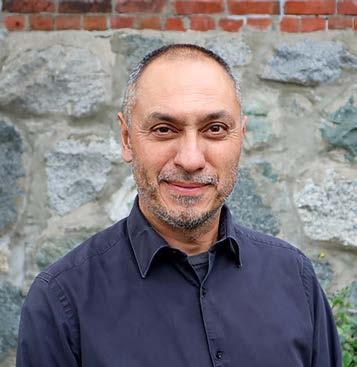
ties that were left stranded by the end of BC Rail passenger service and the departure of Greyhound.
• eliminating privatization throughout B.C.’s public transit systems to ensure better, more reliable services for riders, and fairer benefits and wages for transit workers.
• extending the provincial government’s free transit program to cover all British Columbians 18 and younger.
In the longer term, the plan includes a dramatic expansion and electrification of BC Transit’s bus and HandyDART fleet, new regional
The plan would mean approximately 16,800 direct and spinoff jobs per year from construction, and 23,700 direct and spinoff jobs from ongoing operations. Much of the plan’s costs would be recovered from economic growth and revenue generated through increased density near new and expanded transit hubs.
B.C.’s economy would also see a boost from reductions in traffic congestion, while employers and employees alike would benefit from shorter, more reliable commutes. Communities would see cleaner air and less sprawl, and B.C. would make crucial progress toward the province’s climate reduction targets.
Stronger transit connections across B.C. would also have a big impact on tourism and lead to a cleaner province, making a central contribution to dramatically reducing the one-third of B.C.’s greenhouse gas emissions that come from transportation.
As well, affordable, viable transit options would allow many B.C. families to save on vehicle costs — with annual savings potentially reaching $10,000 for those choosing to quit driving altogether.
Connecting B.C. is part of the BCFED’s Climate Justice and Jobs Plan for BC, currently under development in consultation with unions, working people and communities throughout B.C. The full report and additional quotes are available at bcfed.ca/connecting-bc or policyalternatives.ca/connecting-bc
The following is a news release from the BCFED, issued February 22, 2024.
Today’s provincial budget will provide welcome relief for working families struggling with rising costs, the BC Federation of Labour (BCFED) said today.
BCFED president Sussanne Skidmore said the budget continues to invest in critical services like health care, education and seniors supports, demonstrating that the government has been listening closely to what the public needs. “Now is not the time for cuts and belt-tightening. We’re happy to see this government is investing in people,” said Skidmore.
The new BC Builds program will quickly create new homes targeted to working people, she said. “BC Builds is a good start for creating more affordable homes so workers can stay in their communities,” said Skidmore.

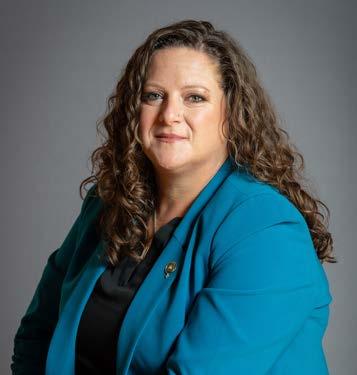
While measures like the temporary increase to the BC Family Benefit and the new one-time BC Electricity Affordability Credit will help, the BCFED said working people need more long-term relief. “The government is on the right track by tackling afford -
BC FORUM is inviting members to the 2024 Annual General Meeting.
Please hold June 19, 2024 in your calendars.
Location is still to be determined.
Stay tuned for details as they become available, and check for updates on our website at bcforum.ca and our Facebook page at facebook.com/BCRetiredUnionMembersForum


ability, as working people struggle with rising costs for necessities like groceries and housing. B.C.’s lowestpaid workers need to see real wage increases and a reduction in their household costs,” said Skidmore.
The government can take steps to immediately improve affordability for families, said BCFED secretarytreasurer Hermender Singh Kailley. “We need to close the gap between the minimum wage and the living wage. We can start by implementing a pay equity strategy to end pay discrimination, which will boost earnings for many of B.C.’s lowest-paid workers.”
The budget includes a modest increase in funding for the Employment Standards Branch. “We think the government should seize an opportunity to reimagine the Employment Standards Branch and the way it delivers services to working people,” said Skidmore. “Complaints need to be addressed faster to get owed wages back into workers’ pockets, and the branch must engage in proactive strategies that prevent violations in the first place.”
“We are pleased to see continued investments to build required capital infrastructure to meet the needs of our growing communities,” said Skidmore. She pointed to the public transit plan released last Friday by the BCFED and the B.C. Office of the Canadian Centre for Policy Alternatives as another opportunity for capital investment that would help businesses and workers. “Building great public transit provides an economic boost while saving families a lot of money, and creating thousands of great, wellpaying jobs,” she said.
Find more BCFED news releases at https://bcfed.ca/news
The following are a few highlights of news from the B.C. Seniors Advocate, Dan Levitt. For full details search Seniors Advocate – Government of British Columbia (seniorsadvocatebc.ca ) and look up Newsletters
Province names new seniors advocate:
The Province has appointed Dan Levitt as the new seniors advocate for British Columbia as government continues to support oversight and advocacy toward seniors care and the programs and services seniors need.
“Dan Levitt has championed the rights of seniors for 30 years and with his extensive experience he is an excellent choice for B.C.’s seniors advocate,” said Adrian Dix, Minister of Health. “Isobel Mackenzie became the first seniors advocate in Canada and we thank her for being a powerful, impactful voice. With Mr. Levitt, government will continue to work collaboratively to help seniors throughout the province to live their healthiest, happiest lives.”
Tax Filing - It is more important than ever to file an income tax return, even if you don’t owe any money. Your eligibility for many important government supports, such as the new Canadian Dental Plan and Guaranteed Income Supplement, are based on your annual income tax return.
Forward with Dementia:
Free, downloadable resources for people with dementia, care partners and health care providers that have been developed specifically for different cultural communities are now available on the Forward with Dementia website. These new

brochures, Q&As and other materials are available in English, Simplified and Traditional Chinese, Italian, and Punjabi, with French coming soon. To learn more go to forwardwithdementia.ca/news/category-news/
Dementia is a major public health problem in Canada and around the world, affecting millions of people. Research indicates significant variations in the risk of development, prevalence, clinical presentation, and health outcomes across various communities in Canada, including differences in ethnicity, race, sex, gender and age. The study is available at: alzheimer.ca/ en/the-many-faces-of-dementia-incanada-landmark-study-volume-2
The 2023 NIA (National Institute on Ageing) Ageing in Canada Survey report by the NIA, in partnership with the Environics Institute for Survey
Research, takes an in-depth look at the perspectives of growing older in Canada using a base sample of 5,875 Canadians. The survey is the largest of its kind in Canada and provides the first follow-up look at the perspectives and experiences of Canadians 50 and older across three key dimensions of ageing well — social well-being, financial security, and health and independence — since its inaugural launch last year. For more information and to read the report, go to www.niageing.ca/2023-annualsurvey
The B.C. Jewish Seniors Alliance is offering free training for seniors interested in becoming Senior Peer Support Volunteers. Once training is complete, volunteers offer friendly phone calls and home visits, bereavement support and accompaniment to appointments for other seniors. To learn more go to: jsalliance.org/peer-support-2/
On February 15, Isobel Mackenzie released her report Resourceful and Resilient: Challenges Facing B.C.’s Rural Seniors
You can read the full report at Resourceful and Resilient: Challenges Facing B.C.’s Rural Seniors – Seniors Advocate (seniorsadvocatebc.ca)
Highlights from the report include:
• Seniors are 25% of B.C.’s rural
population compared to urban B.C. where seniors are 19% of the population;
• The seniors’ population in rural B.C. is growing faster than urban B.C. and by 2032, seniors will be 29% of the population of rural B.C. compared to 21% in urban B.C.;
• Seniors in communities in the Northern, Interior and Vancouver Island health authorities have a lower life expectancy compared to those in Vancouver Coastal and Fraser health authorities where more of the population is concentrated in urban centres;
• 17% of rural seniors do not have a family doctor or nurse practitioner compared to 13% of urban seniors, and hours and days of access to a clinic in rural communities are
more limited compared to those in urban centers;
• 51% of seniors in rural B.C. communities are married, compared to 63% in urban areas with single seniors more likely to need home support, assisted living and long-term care;
• Rural seniors have both lower average and median incomes than their urban counterparts and their overall wealth is estimated to be two thirds less;
• The rate of acute care beds per 1,000 population is 70% lower in rural B.C. and the average length of stay as an alternative level of care (ALC) patient is 27% higher (85% of ALC patients are 65+);
The report makes seven recommendations:

liuna1611.org
1. Develop and Implement a Rural Seniors Housing Strategy
2. Develop and Implement a Rural Health Human Resource Strategy
3. Develop and Implement Rural Seniors Home and Community Care Strategy
4. Develop and Implement a Provincial Long-Term Care and Assisted Living Plan Based on Equity Throughout the Province
5. Develop and Implement a Provincial Rural Transportation Strategy
6. Improve and Better Promote both the Provincial Travel Assistance Program (TAP) and Hope Air
7. Increase Rural Representation in Government through the creation of a Ministry or Minister of State for Rural B.C.

by Elaine Littmann , HEU
The seniors’ care landscape has endured waves of change over the last 20 years, and care aide Jennifer Reitan has had a front row seat since 1997.
That’s when she left her first job at Lions Gate Hospital and moved to Castlegar, a town of 8,000 set among the powerful rivers and rugged mountains of southeastern B.C.
Her new employer was and still is a privately operated facility. But in the 1990s, almost all long-term care sites that received public funding were covered under a single collective agreement, and owners were affiliated with the Health Employers Association of BC (HEABC).
So, when Reitan started her job in the Interior, she was covered by the Facilities Bargaining Association (FBA) contract, with the same wages, benefits, pension and working conditions as care aides at public hospitals.
This “master agreement” was an achievement HEU had bargained hard for. It created more fairness and stability for workers, but it also meant health authorities had more direct oversight of standards and conditions of care.
Then in 2001, the B.C. Liberal government was elected, and with them came their relentless drive to privatize.
They passed new laws that removed contracting-out protections that were in the HEU contract since the 1960s, and eliminated employment security language for health care workers.
The BC Liberals also allowed seniors’ care operators like Reitan’s to opt out of membership in the HEABC, but keep receiving public funding.
An estimated 8,000 HEU members were fired in the first five years, as health authorities and long-term care
operators privatized a long list of health services, and a raft of new private operators entered the sector.
Workers who were hired back by private contractors took an overnight pay cut of up to 50 per cent. And they no longer had a union.
HEU scrambled to re-organize the workers, but each deal was an individual, hard-won agreement with a single contractor. There was no way to get the contracted workers back under the master agreement.
Jennifer Reitan, now an occupational health and safety steward at her local, has represented members on the bargaining committee.

She says that when her employer withdrew from the HEABC, “we got pulled out of the municipal pension plan immediately. And when we went to bargain a new contract, the employer suddenly told us they were operating at a loss, and we had to take cuts.
“But we couldn’t afford to lose it all from our wages. So, we also took less holidays, less sick time, a different benefit package.”
Once her workplace was removed from the FBA agreement, she says, her sense of connection with other longterm care facilities slipped away.
And without the direct administration of the health authority, Reitan felt there wasn’t much oversight for her small care home in the Kootenays.
“We all just went under the radar, I guess. It felt like we were just part of a whole bunch of little facilities.”
Within a decade, the seniors’ care sector was utterly fragmented.
Wages for care aides varied by as much as $7 an hour, standards of care were hard to measure, and there seemed to be no clear system in place to track the public money given to private companies – how much they spent on care, and how much they took as profit.
When the BC NDP regained power in 2017, they restored succession rights to health care workers, and repealed the Liberal legislation that allowed workers to be fired when operators switched contractors.
This brought some stability to the sector for workers, but did not address the deterioration and disparity in care and working conditions created by 16 years of privatization.
In a series of reports, the B.C. Office of the Seniors Advocate found that forprofit operators were spending far less on frontline staff and delivering fewer hours of care than their not-for-profit counterparts.


A 2021 report linked lack of paid sick leave and the contracting out of care staff to some of the largest COVID-19 outbreaks in B.C.’s longterm care and assisted living homes.
The pandemic also accelerated a staffing crisis that had been gathering steam.
“Before the pandemic,” Reitan says, “we were still managing. If you’ve only worked in a private facility, you jus t
accept the conditions, the struggles you have with equipment, and wages.
“But if you also work at Interior Health, you see the differences.
“When COVID hit, it was eye-opening to see all those people that left private facilities or chose to work … [in an] Interior Health site. We never got those people back.”
The wage-levelling program the B.C. government introduced during the pandemic subsidized private facilities so they could maintain staffing levels.
But wage subsidies still didn’t put workers in private sites on par with comparable FBA jobs – they still fell short on benefits, pension, vacation, and shift differentials.
And in the just-released 2023 Seniors Advocate report, research shows what many had suspected. Private and nonprofit care homes are delivering less care than public facilities, while reaping more profit than ever.
“This study shows that contracted care home operators – and especially for-profit operators – are diverting public funds away from the frontline to their bottom line,” says HEU secretarybusiness manager Meena Brisard.
This is no surprise to workers in the sector – or to experts skeptical of the claim that private companies can deliver cheaper care to the same standard as public services.
Donna Baines, a researcher at UBC, says privatization is often linked to an “austerity” agenda, where some governments call for cost-cutting measures and blame economic woes on “big government” and public spending.
“There is rarely evidence to show health care privatization does what it claims. It doesn’t save costs, it’s not more efficient, it doesn’t deliver better services. But politicians just keep going back to it,” says Baines.
“During COVID, polls showed that two-thirds of Canadians supported

moving long-term care back to the public sector. The COVID outcomes in Ontario for seniors were the worst in Canada, and feelings were high that private facilities were failing. And yet right now, Ontario is making huge moves towards privatization,” she says.
In B.C., Brisard says it’s time to reverse that trend, starting with re-establishing a level playing field for seniors’ care.
“A good start would be the implementation of the BC NDP’s 2020 election promise to restore the standard wages, benefits and working conditions dismantled by the previous B.C. Liberal government.”
As for Reitan, she loves her job and her co-workers. And she wants to make sure she is delivering the best residentcentred care possible.
She hopes it can improve, but fears the staffing crisis will have a negative impact on care over the long term.
When asked about the biggest change she’s seen over her career, Reitan doesn’t hesitate.
For herself, “it’s the unknown future. Where am I going to be next year? And my physical and mental well-being, doing this work.”
Despite the challenges, Reitan wants to keep on doing the meaningful and essential work she fell in love with almost 30 years ago.
“That’s why I’m so passionate about HEU’s Care Can’t Wait campaign. Because I feel like if there’s something that I can do to benefit the private facilities out there, then I want to do it.”
The Hospital Employees’ Union is the biggest health care union in B.C., with more than 50,000 members. HEU locals protect members working in every area of health care, all across B.C.
The following is an excerpt from a letter to the constituents of Burnaby-New Westminster from NDP MP Peter Julian
The NDP Dental Care Program is an historic and important step toward the universal health coverage that Canadians need. Because of this program, no one will have to miss going to the dentist because it’s too expensive
Last year, we announced the beginning of the NDP Dental Care Plan, which will start to roll out later this year. I, along with my NDP caucus colleagues and our teams, have worked tirelessly to ensure the government makes this process as smooth as possible.
Eligibility criteria:
• No access to employer/pensionsponsored/private dental insurance.

• Have an annual adjusted family net income under $90,000.
• Be a Canadian resident for tax purposes; and
• Have filed their tax return in the previous year.
• Canadian residents who have access to dental benefits through provincial, territorial and federal social programs who meet the Canadian Dental Care Program eligibility criteria will be able to apply to the program. Benefits will be coordinated to ensure no duplication of coverage.
• Seniors aged 70+ will begin receiving a letter inviting them to apply by phone December 2023 - March 2024, in sequence based on age:
• 87+: Letters sent December 2023
• 77-86: Letters sent January 2024
• 72-76: February 2024
• 70-71: March 2024
• Seniors aged 65-69 will be able to apply online starting in May 2024.
Who are we?
We are 10,000 strong, retired steelworkers and partners, organized in 34 local chapters across Canada.
What do we do?

We work collaboratively with other seniors’ groups to improve our communities and engage in political and educational activities to enhance the well-being of our members.
Can you join?
Yes, if you can agree with and support the guiding principles and programs of SOAR. Annual dues are reasonable at $12 for individual membership and $15 for a couple.
Ready to join?
Contact District 3 SOAR Coordinator Brian Harder at 604-341-6382 or visit usw.ca/soar.
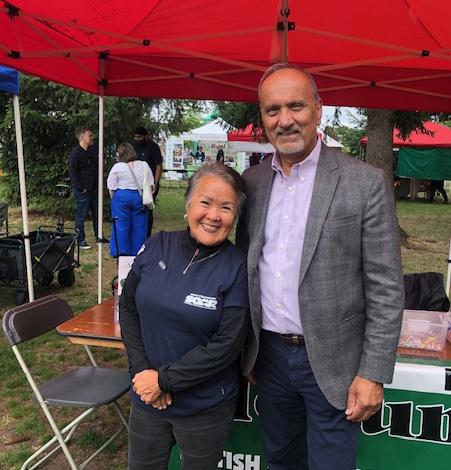

• People with disabilities and children under 18 will be able to apply online in June 2024.
• Applications for all remaining eligible Canadian residents should start by 2025.
Once enrolled, Canadian residents who qualify will be sent a welcome package by Sun Life with a member card and the start date for when their oral health dental care services will start. The earliest coverage start day will be May 1st, 2024.
Getting more Canadians to the dentist, free of charge, will make life more affordable for families and keep everyone healthier. With the NDP, you pay less and get more.
By Sam Wiese, BC FORUM President
At the close of our February 20th Board of Directors meeting John Savage announced that he was taking the final step into retirement and resigning his position of director for Unifor.
John has been an actively involved member of the board for over 15 years. Always with a positive attitude John held his position on your board as an honour. He would willingly lend a hand staffing the BC FORUM booth whenever he was available and you could be assured that he would provide knowledgeable input during any debate.
While John leaves his position on the Board of Directors, he is intent on remaining an active BC FORUM member, indeed, as a parting gift he
wrote out some ideas on how to keep BC FORUM relevant and sustainable into the future.
Our sincerest thanks for all John has done for us. To his family and other friends who unselfishly allowed us to dominate so much of his time, we truly do appreciate it.
I know I’ll see you at some worthy event, so, not goodbye, but...catch you later, Brother!
By Marion Pollack, BC FORUM Director
This year it is more important than ever that retirees/seniors file our 2023 income taxes. Many federal and provincial income benefits are tied into filing income tax. Provincially this includes:
• Fair PharmaCare (which assists British Columbians with the cost of prescription drugs).
• SAFER, the Shelter Allowance for Elderly Renters (which assists some low to moderate income renters with the cost of their rent).
• The BC Seniors Bus Pass (which assists seniors primarily receiving the Guaranteed Income Supplement with the cost of bus transportation).
Federally this includes:
• The Guaranteed Income Supplement or GIS (which keeps very

low income seniors out of extreme poverty. Over 22% of seniors in B.C. receive the GIS).
• The new Canadian Dental Care Plan (CDCP)
In 2024, the CDCP is being rolled out to people who are 65 years of age and older. This plan will help seniors take care of our oral health and is very needed. There are several criteria to be eligible for this new dental plan
and one is that you filed your previous year income tax. You will need to continue to file income tax every year to maintain your eligibility to this needed plan.
Many community agencies including seniors centres run free income tax clinics. They are for retirees/seniors of modest income, face housing insecurity, or are newcomers to Canada.
To get more information and to find a free community based income tax clinic near you go to: www.canada. ca/en/revenue-agency/services/tax/ individuals/community-volunteerincome-tax-program
Marion represents the Canadian Union of Postal Workers on the BC FORUM Board of Directors.
By Gwenne Farrell, BC FORUM 2nd VP
In April of 2020 when we were all being asked to stay within a small bubble of in person contacts I became a volunteer for Brella Community Services (formerly known as Seniors Come Share Society). My first role as a volunteer was to once a week phone isolated seniors to see if they needed any additional support. I learned that they didn’t really need more support, they just needed someone to talk to. Doing this was very fulfilling for me as I knew I was helping people.
Then in January 2021 the Brella Volunteer Coordinator asked for people willing to be part of the Community Volunteer Income Tax Clinic (CVITC) which provides free income tax preparation for, in particular, low income seniors. Given I had been doing taxes for family and friends for more than two decades, this was a no brainer for me so I immediately signed up.

This year will mark my fourth year doing the CVITC. Brella made it easy by providing the option of preparing the seniors’ income tax virtually from my home. As part of this process I have been through a criminal record check and had to be approved by the Canada Revenue Agency. The process includes very strict rules to protect confidentiality and to ensure no personal
information is kept once the taxes have been filed electronically.
I keep returning to volunteer for the CVITC (even though since I initially stepped forward my life is much busier) because of what I have seen through this program. There are times when my heart breaks recognizing how little some of these clients manage to survive on. I personally cannot imagine how in such an expensive area like Metro Vancouver they are able to sustain themselves, but they do. I also keep coming back to do this because of the amount of appreciation that I receive from these clients. Some have even started requesting me personally when they book their appointment for tax preparation.
The CVITC only requires me to volunteer four hours a week for the months of March and April each year but I know those few hours make a difference to those who need it.
The following are highlights from the federal Minister for Seniors. To get the full information go to Employment and Social Development Canada and search Updates from the Minister for Seniors
February 5 to 11 marked White Cane Week, a time to help raise public awareness of the challenges facing Canadians living with vision loss. As we get older, it’s normal for our vision to change. To learn about the steps you can take to preserve your eyesight and vision, visit the Seniors and AgingVision Care webpage.
Don’t fall for scams! The Canadian Anti-Fraud Centre is noticing a combination of romance and investment

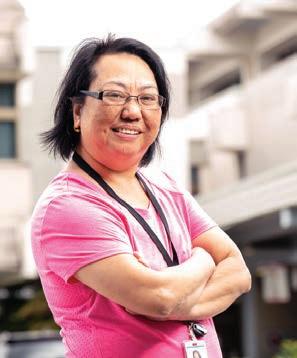
scams. In these scams, victims are contacted on dating apps or social media by a fraudster who is attempting to develop a relationship with them to gain their trust and affection.
We encourage you to visit the Canadian Anti-Fraud Centre’s webpage on romance scams to learn more about what red flags to look for.
Did you know you can visit the Older travellers webpage for information to help you have safe and healthy travels this winter? It has a wealth of useful information, including advice and tips for older travellers. If you are visiting Canada and arriving at one of the main airports, you can complete your customs and immigration declaration at a kiosk or eGate upon arrival.

Save time and submit an Advance Declaration up to 72 hours before you arrive in Canada. When you use this feature, you can benefit from special access to express lanes in the arrivals hall.
To submit an Advance Declaration, you will first need to access the ArriveCAN app and create your account.
Service Canada is aware of scams targeting Canadians related to the Canadian Dental Care Plan. Service Canada usually sends mail in beige or white envelopes with the official Canada wordmark. If you are concerned about the legitimacy of a (cont. on next page)



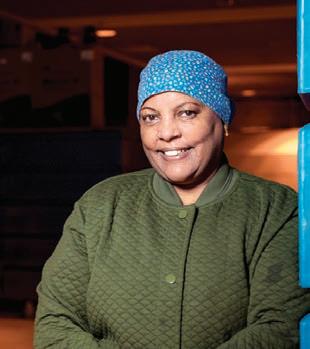
(cont. from previous page)
letter you received regarding the Canadian Dental Care Plan, you can contact Service Canada at 1-833-5374342 (TTY: 1-833-677-6262).
he c O MM i t M e nts made by Canada’s New Democrats during the current election make it clear they are working for ordinary people.
BHere is a short list of highlights:
ritish cOluMBiA will re-establish a human rights commission to fight inequality and discrimination, Premier John Horgan has announced.
(cont. from page 3)
• Create more than a million good family-sustaining jobs as part of plans to address the climate crisis, boost economic recovery, and make life better for people.
• Create at least 500,000 units of quality affordable housing, with half of that within five years.
• Kick start construction of co-op, social and non-profit housing.
• While construction is underway, provide immediate relief for families that are struggling to afford rent.
As we continue to roll out the Canadian Dental Care Plan, I am happy to share with you that Service Canada has approved over 400,000 applications since mid-December 2023. I want to take a moment to remind Canadians that this is the largest rollout of any benefit in Canadian history. We’re averaging about 20,000 new individuals signing up each and every day, and we’ve sent out about half of the 4.1 million letters inviting seniors to apply. With that, I want to thank Canadians for embracing the phased approach.
“Every person deserves to be treated with dignity and respect. By re-establishing a human rights commission, we will create a more inclusive and just society, where we work together to eliminate inequality and prevent discrimination on the basis of race, religion, sexual orientation, gender identity and gender expression,” said Horgan.
• Restore door-to-door mail delivery to communities that lost it under the Conservative government, and develop a model of postal banking for unserved communities.
British Columbia is the only province in Canada without a human rights commission. The previous commission was dismantled in 2002. Only a complaint-driven tribunal remains.
“Building a better B.C. that is vibrant and full of opportunity starts with making sure everyone feels welcome to be a part of that future. Not only must we address discrimination when and where it happens, we must also educate, reach out, and take proactive steps to address systemic inequalities,” said Attorney General David Eby.
Each month, Service Canada will contact another new group of seniors, based on age. Applications remain open for those 77 years or older, and we are expanding the rollout to more seniors this month. That means potentially eligible seniors aged 72 to 76 will start receiving letters inviting them to apply to the Canadian Dental Care Plan, with instructions on how to validate their eligibility and apply to the plan by phone.
“The BC Federation of Labour believes strongly that human rights are workers’ rights, and that systemic discrimination of marginalized workers needs to be addressed at the
• New access to training and education, and targeted support for workers and communities so the low carbon future works for everyone.
If you have already received your letter, you can apply now! Call Service Canada and apply via the automated interactive voice response system.
• A living federal minimum wage, starting at $15 an hour and rising to $20 an hour, indexed to inflation.
We encourage you to share this information with your friends, family and other older adults in your life.
• Paid sick leave, and expanded Employment Insurance sickness benefits.
For more details, including eligibility, services covered, and the phased rollout, visit the Government of Canada’s Dental Coverage web page.
• Universal $10 a day child care, and creating more spaces so parents don’t spend months on wait lists.
North Shore community they know and love,” said Ravi Kahlon, Minister of Housing. “This is our Homes for People action plan at work, creating the types of housing options we need, so everyone can find a home that suits their need.”
• Immediate action to lift every senior and person with a disability out of poverty.
• Implement universal Pharmacare by late 2022, and universal dental care.
highest level,” said Irene Lanzinger, President of the BC Federation of Labour. “The BC Human Rights Commission can help to address this discrimination.”
• End for-profit long term care, and set national standards for home care and long term care.
• Protect defined benefit pension plans, ensure pensioners are at the front of the line if a company goes bankrupt, and mandate industryfinanced pension insurance.
Provincially, things are starting to build up, and not just with housing. We all know that this is an election year in B.C. We are going to see and hear more from the Liberals, rebranded as the BC United, and the provincial Conservatives. You’re also going to hear more from our current government, all with the intent of receiving your vote. What I would ask of everyone is to get involved in the discussion, take the time to become informed as to what each party envisions for B.C., then join in or start the discussion and maybe even
• A national seniors strategy to ensure everyone can age with dignity, with funding to tackle dementia and prevent elder abuse. For more details, see “Ready for Better” at ndp.ca

“I have asked Parliamentary Secretary Ravi Kahlon to lead the public consultation process and I look forward to receiving his recommendations.”
British cOluMBiA will re-establish a human rights commission to fight inequality and discrimin ation, Premier John Horgan has announced.
The consultation process will include both online and face-to-face meetings with British Columbians, stakeholders and human rights experts, and will seek to learn what a renewed human rights commission could look like. Consultation is to continue through the autumn months, with legislation expected to follow in 2018.
For a special discount,
“Every person deserves to be treated with dignity and respect. By re-establishing a human rights commission, we will create a more inclusive and just society, where we work together to eliminate inequal ity and prevent discrimination on the basis of race, religion, sexual orien tation, gender identity and gender expression,” said Horgan.
The labour movement praised the announcement.
British Columbia is the only province in Canada without a human

highest level,” said Irene Lanzinger, President of the BC Federation of Labour. “The BC Human Rights Commission can help to address this

lease have a look at the mailing label on this edition of The Advocate to check whether your membership is now due for renewal. If your membership is about to expire, you can renew by mailing the coupon below to BC FORUM, #200 - 5118 Joyce St., Vancouver, B.C. V5R 4H1. You can also join us or renew your membership on-line at www.bcforum.ca.
leasehavealook at the mailing label on this edition of The Advocate to check whether your membership is now due for renewal. If your membership is about to expire, you can renew by mailing the coupon below to BC FORUM, #200 - 5118 Joyce St., Vancouver, B.C. V5R 4H1. You can also join us or renew your membership on-line at www.bcforum.ca
lease have a look at the mailing label on this edition of The Advocate to check whether your membership is now due for renewal. If your membership is about to expire, you can renew by mailing the coupon below to BC FORUM, #200 - 5118 Joyce St.,Vancouver, B.C.V5R 4H1. You can also join us or renew your membership on-line at www.bcforum.ca.
BBBhrough our unions we saw the benefits of collective action. We know our voices are strongest when we stand in solidarity. That’s where BC FORUM comes in. We are the only provincial organization that represents union members who have retired or are nearing retirement. We are an integral part of the labour movement, with formal representation in leadership bodies, and we maintain strong links with provincial and national seniors’ groups. Here’s how you can support and benefit from BC FORUM:
FORUM has never been more important
Please encourage your friends to join our team
encourage your friends to join our
Please encourage your friends to join our team
C FORUM actively welcomes members who are 50 and better, working or retired,and the list of unions that cover the first year dues for their qualified members keeps growing! We welcome CUPE 402 and the B.C. Ferry and Marine Workers Union to the ranks of unions that support our campaigns and our work.
cforum actively welcomes members who are 50 and better, working or retired, and the list of unions that cover the first year dues for their qualified members keeps growing! We welcome CUPE 402 and the B.C. Ferry and Marine Workers Union to the ranks of unions that support our campaigns and our work.
c forum actively welcomes members who are 50 and better, working or retired, and the list of unions that cover the first year dues for their qualified members keeps growing! We welcome CUPE 402 and the B.C. Ferry and Marine Workers Union to the ranks of unions that support our campaigns and our work.
hroughourunions , before we retired, we’ve all seen the benefits of collective action. Our voices are strongest when we stand together in solidarity.
hrough our unions, before we retired, we’ve all seen the benefits of collective action.Our voices are strongest when we stand together in solidarity.
hrough our unions , before we retired, we’ve all seen the benefits of collective action. Our voices are strongest when we stand together in solidarity.
If you’re not yet a member, contact your union for details. Some even pay dues for three years. And don’t be shy about encouraging your friends and family members to join us. Solidarity makes us strong.
If you’re not yet a member, contact your union for details. Some even pay dues for three years. And don’t be shy about encouraging your friends and family members to join us. Solidarity makes us strong.
Look at the mailing label on this edition of the Advocate to check whether your membership is now due for renewal. If your membership is about to expire, you can renew by mailing the coupon below to BC FORUM, 110 - 4295 Canada Way, Burnaby, BC V5G 1H1; or renew online at www.bcforum.ca.
If you’re not yet a member, contact your union for details. Some even pay dues for three years. And don’t be shy about encouraging your friends and family members to join us. Solidarity makes us strong.
BC F ORUM has always provided free $2,500 Accidental Death and Dismemberment insurance coverage to members.
Together, we can make a difference for ourselves and our families. Please encourage friends, colleagues and family members to join!
BC FORUM has always provided free $2,500 Accidental Death and Dismemberment insurance coverage to members.
BC FORUM has always provided free $2,500 Accidental Death and Dismemberment insurance coverage to members.
BC FORUM has always provided free $2,500 Accidental Death and Dismemberment insurance coverage to members.
We are proud to extend this coverage to members’ spouses at the low cost of $5 per year. All you have to do is check the appropriate box when you apply or renew your membership. BC FORUM’s AD&D coverage is valid until you reach age 86, the maximum age we were able to negotiate.
We are proud to extend this coverage to members’ spouses at the low cost of $5 per year. All you have to do is checkthe appropriate box when you apply or renewyour membership. BC F ORUM ’ s AD&D coverage is valid until you reach age 86, the maximum age we were able to negotiate.
BC FORUM actively welcomes union members who are 50 and better, working or retired, and the list of unions that cover the first (and some up to three years!) membership for their qualified members keeps growing! If you’re not yet a member, contact your union for details. Solidarity makes us strong!
We are proud to extend this coverage to members’ spouses at the low cost of $5 per year. All you have to do is check the appropriate box when you apply or renew your membership. BC FORUM’s AD&D coverage is valid until you reach age 86, the maximum age we were able to negotiate.
That’s where BC FORUM comes in. We are the only provincial organization that represents union members who have retired or are nearing retirement. We are an integral part of the labour movement, with formal representation in leadership bodies, and maintain strong links with provincial and national seniors’ groups.
We are proud to extend this coverage to members’ spouses at the low cost of $5 per year. All you have to do is check the appropriate box when you apply or renew your membership. BC FORUM’s AD&D coverage is valid until you reach age 86, the maximum age we were able to negotiate.
Together, we can make a difference for ourselves and our families. Please encourage friends, colleagues and family members to join us using the form below, or on-line at www.bcforum.ca.
That’s where BC FORUM comes in. We are the only provincial organization that represents union members who have retired or are nearing retirement. We are an integral part of the labour movement, with formal representation in leadership bodies, and maintain strong links with provincial and national seniors’ groups. Together, we can make a difference for ourselves and our families. Please encourage friends, colleagues and family members to join us using the form below, or on-line at www.bcforum.ca.
That’s where BC FORUM comes in. We are the only provincial organization that represents union members who have retired or are nearing retirement. We are an integral part of the labour movement, with formal representation in leadership bodies, and maintain strong links with provincial and national seniors’ groups. Together, we can make a difference for ourselves and our families. Please encourage friends, colleagues and family members to join us using the form below, or on-line at www.bcforum.ca.
Your expiry date is on the mailing label. BCGEU, BCFMW, HSA, MoveUp, CEU, CUPE Locals 386, 402 and 7000; UFCW 1518, Heat and Frost, and LiUNA 1611 pay first year dues for qualified members.
Your expiry date is on the mailing label. BCGEU, BCFMW, HSA, MoveUp, CEU, CUPE Locals 386, 402 and 7000; UFCW 1518, Heat and Frost, and LiUNA 1611 pay first year dues for qualified members.

B.C. Federation of Retired Union Members • Mailing: #406 - 4370 Dominion Burnaby, BC V5G 4L7 604 688-4565 • 1 800 896-5678 • Fax: 604 430-5917 • bcforum@bcfed.ca • www.bcforum.ca
B.C. Federation of Retired Union Members • 110-4295 Canada Way, Burnaby V5G 1H1 604 688-4565 • 1 800 896-5678 • Fax: 604 430-5917 • bcforum@bcfed.ca • www.bcforum.ca
Membership: q
q Renewal q
Spouse’s
Spouse’s
Cheque
By Sam Wiese, BC FORUM President
It’s an election year here in B.C. and if you were raised anything like me your parents cautioned you about two things never to discuss – religion and politics. While I can acquiesce on the first point, I have never understood the logic in the second, not talking about politics.
Talking about politics can be tricky. How do you handle that relative who continuously sends you emails and texts exaggerating information about a party to the point where it becomes “fake news”? Do you keep quiet when your views on an issue are in complete opposition of those of family and friends? Do you quickly adjust the topic of conversation or remain silent to avoid causing dissention?

Find common ground. Even if you are on opposite ends of the political spectrum, there’s often at least one thing you can agree on. Discovering what that is and noting it during the conversation can help make politics feel less divisive.
Know when to end it. If the person you’re talking with offends you or if you feel like you can’t respond respectfully, call it quits.
While it may seem a bit daunting to “talk politics”, all it really entails is talking about life. It’s a willingness to talk about the things that affect each and every one of us on a daily basis. It can be as basic as tasking a young family member with making a plan with their friends to get out and vote, or delving into party platforms and then analyzing them to determine the immediate and long-term effect each would have on your community. It may seem daunting at first, so I am hoping that you will find these few tips I have learned over decades of encouraging “member-to-member” political engagement helpful enough to use and share with others.
Talk in person. A colleague posted a political meme that you find offensive. You might be tempted to call them out by commenting on the post. Instead, have the conversation faceto-face—or at least offline. You’ll both be less likely to insult each other this way. There’s something about seeing a person’s face that reminds you that they are an actual person.
Ask questions. Rather than simply stating something like, “The government needs to do more about climate change.” Show interest and start open debate by asking, “What do you think should be done to protect our planet for the future?” By engaging instead of lecturing, everyone involved in the conversation (and those listening in) may learn something.
Adjust your perspective. It’s unlikely that you are going to change someone’s mind, or vice versa. Instead, alter your goal to understanding their point of view and hopefully they will do likewise.
Walk away when it’s not worth it. We can’t politely engage in political debate when it’s being used as a guise for extreme bias or bigotry. In any situation which you are made to feel unsafe or invalidated, walk away. There’s a difference between having a political debate and being attacked.
Go vote! This is the easiest talking point when talking politics; discussing your intent to vote on or before October 19, 2024 and challenging everyone to do the same. Emphasize that a mark on that ballot is their voice being spoken, that by exercising this right they are speaking the last word in the debate which is this election cycle.
Please send your new address and e-mail address to BC FORUM. You can mail in the form on page 15, or you can reach us by telephone at 1.800.896.5678 (toll free) or 604.688.4565; or by email at bcforum@bcfed.ca.
Please check the expiry date on your label. Is your membership due for renewal?